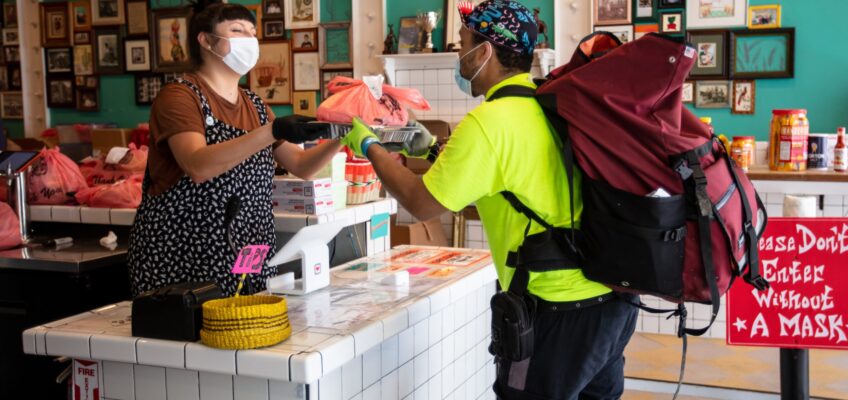FOR IMMEDIATE RELEASE
Contact: Virgil McDill, vmcdill@ilsr.org, 202.294.9187
New Report Explores How Local Restaurant Delivery Services Are Proving There Are Better Alternatives to the Big Apps
Unlike the predatory Wall Street-backed apps, local delivery services charge lower fees, support restaurants, keep wealth in the community, and demonstrate that when it comes to food delivery, local delivery models are better and more efficient
WASHINGTON, D.C. (May 25, 2021) – A new report from the Institute for Local Self-Reliance spotlights 20 local restaurant delivery businesses and explains why these independent businesses are a better alternative to the big national delivery apps like Grubhub, DoorDash, and Uber Eats whose exorbitant fees and deceptive practices are killing restaurants.
Dozens of locally based alternatives to the big, Wall Street-backed third-party delivery apps have popped up during the pandemic, proving not only that restaurant meal delivery can be done in a way that supports locally owned restaurants and builds local wealth, but also exposing the sham at the heart of the big delivery apps’ flawed business model: In the food-delivery sector, local is better and more efficient.
The independent entrepreneurs profiled in the report, Special Delivery, are building viable businesses — all while charging restaurants less, paying their drivers more, and avoiding deceptive and predatory tactics. As an owner-worker at one of the businesses says in the report, “the whole goal is to put the money back into our pockets, back into restaurant pockets, back into the community.”
“The economics of the big apps make no sense; they continue to post huge losses, while their predatory policies and exorbitant fees are literally killing tens of thousands of local restaurants,” said Kennedy Smith, a Senior Researcher with ILSR and the report’s author. “The only things DoorDash, Grubhub, Postmates, and UberEats have on their side are financial backing from Wall Street and a regulatory environment that tilts the playing field in their favor. The local delivery businesses in this report are demonstrating a better, more sustainable model that puts money back into restaurants and back into the community.”
“The big apps offer no real economies of scale,” Smith continued. “They present themselves as innovators, but the business really just involves people driving food orders to customers’ homes — an inherently local, labor-intensive service. And because local delivery services don’t have to repay venture capital or meet stockholder’s revenue expectations, they can provide this service to restaurants and their customers for less.”
Rather than a cookie-cutter approach, the local delivery services profiled in the report customize their operations to fit their community’s needs. Some are cooperatively owned, either by restaurants or delivery drivers. Some deliver items from local stores as well as restaurant meals. While all have much lower fees than the dominant apps, some earn income on both the customer and restaurant sides of the ledger, while others only charge customers. Lexington, Kentucky’s Delivery Co-op, for example, is owned by local restaurants and drivers, while Slurpalicious in Astoria, Ore., charges restaurants almost nothing, relying instead on customers, who pay seven percent of the tab, plus 60 cents per mile, round-trip.
The pushback against big delivery apps is part of a growing grassroots movement fighting back against excessive corporate control of our local economies. As with federal efforts to rein in Amazon and other large Big Tech companies, there is an increased appetite for new federal, state, and local policies to combat monopoly power. This report includes a series of recommendations to help local meal-delivery businesses thrive, including capping third-party delivery fees, prohibiting predatory activity, and providing capital for the local delivery businesses.
The full report is available here.
About the Institute for Local Self-Reliance
The Institute for Local Self-Reliance (ILSR) is a national nonprofit research and educational organization founded in 1974. ILSR has a vision of thriving, diverse, equitable communities. To reach this vision, we build local power to fight corporate control. We believe that democracy can only thrive when economic and political power is widely dispersed. Whether it’s fighting back against the outsize power of monopolies like Amazon or advocating to keep local renewable energy in the community that produced it, ILSR advocates for solutions that harness the power of citizens and communities. More at www.ilsr.org





